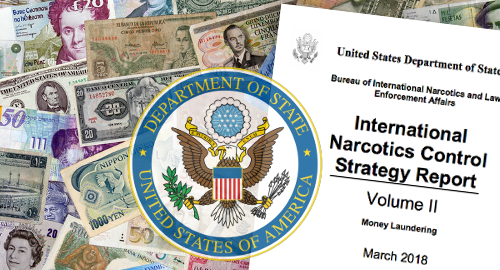 The U.S. Department of State is back again with its annual list of everything that other nations are doing wrong in the fight against money laundering.
The U.S. Department of State is back again with its annual list of everything that other nations are doing wrong in the fight against money laundering.
The DOS recently released its annual International Narcotics Control Strategy Report (INCSR), which does a global whip-round of every country in the world to determine whether or not those countries are doing enough to keep drugs out of American hands, lungs, nostrils, veins et al.
Failure to make demonstrable progress in these areas can lead America to cut off financial aid to a country, although exceptions can be made for any government deemed to be vital to U.S. national interests. So basically, if you’ve got an airstrip that can and will accept B-2 stealth bombers, you can probably export all the fentanyl you want.
The INCSR is split into two volumes, with the second volume devoted to anti-money laundering (AML) efforts and which contains many references to the gaming industry. For example, the INCSR notes that “no casino located in Cambodia has ever filed a CTR” [currency transaction report] and the volume of filed suspicious transaction reports (STR) “is very small, reportedly less than five” in all of 2017.
Continuing on an alphabetical basis, Costa Rica’s online sportsbooks “are suspected of laundering millions of dollars, directly and through extortionate money lending operations.” Casinos in the Turkish-controlled area of Cyprus are “essentially unregulated, and therefore vulnerable to money laundering.” The rapid growth and “corresponding lack of AML regulatory supervision” at the roughly 140 small casinos in the Republic of Georgia are “concerning.”
As the world’s top casino hub, Macau’s gaming industry gets a proper drubbing in the INCSR. Among other things, the U.S. would like to see Macau “encourage” smaller junket operators with weak AML controls to exit the market, while regulators are urged to lower the existing $62,640 threshold for reporting transactions to the ‘international standard’ of $3k.
The INCSR praises the Philippines for finally bringing casinos under the category of ‘covered persons’ in the new Anti-Money Laundering Act, while slamming them for not including junket operators, excluding non-cash transactions for AML reporting purposes, and its $100k single-transaction reporting threshold.
Philippine casinos’ thriving ‘proxy betting’ business also comes under scrutiny, as do the conflict-of-interest issues of the Philippine Amusement and Gaming Corporation’s (PAGCOR) ongoing dual role as both regulator and gaming operator. Curiously, the INCSR makes no mention whatsoever of the Philippines’ thriving online gambling industry.
We’ll end our global tour in Antigua and Barbuda, where the INCSR notes that the country “has largely achieved technical compliance with international AML standards” but still the country “continues to work to improve its AML regime.”
The INCSR notes that casinos have “a strong presence” in Antigua “although the internet gaming industry has declined.” The INCSR notes there are currently only “four internet gaming enterprises” calling Antigua home.
The INCSR conveniently omits the U.S. government’s role in reducing Antigua’s once-thriving online gaming sector to its current diminished state. Ignoring its international trade obligations and multiple World Trade Organization rulings in Antigua’s favor, the U.S. continues to deny Antigua’s online gambling industry access to the U.S. market.
Ironically, the INCSR was issued just as the U.S. is crying foul over China’s trade barriers. Maybe until the U.S. pays Antigua the roughly $300m in WTO-mandated penalties that have accrued over the years, Uncle Sam should stop lecturing other nations on how to conduct themselves on the world stage.